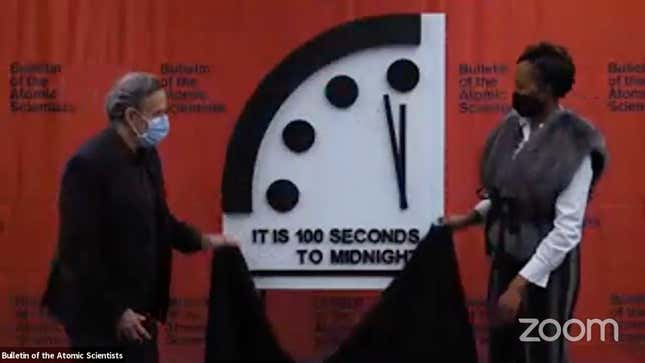This is an article from 2021. Read our most recent coverage of the Doomsday Clock: In 2022, the Doomsday Clock didn’t change for the second year running
The Bulletin of the Atomic Scientists announced today that it is keeping the minute hand of the “Doomsday Clock” at 100 seconds to midnight. (In the parlance of the Doomsday Clock, midnight is doomsday.)
The decision comes as a result of continued concern about nuclear weapons, climate change, and the failure of governments and international organizations to respond in productive ways. “The pandemic revealed just how unprepared and unwilling countries and the international system are to handle global emergencies properly,” Bulletin CEO Rachel Bronson said at the announcement. Said Jerry Brown, former governor of California and executive chair at the Bulletin: “The politicians are asleep!”
The 2021 change to the Doomsday Clock
Created by scientists who had developed the first atomic weapons as part of the Manhattan Project, the clock’s early years were driven by nuclear threats and weapons testing. In the last nine adjustments, climate change has been cited as a factor expected to contribute to civilization’s march towards mass catastrophe.
Covid-19’s effect on the Doomsday Clock
Rarely has disease been cited as a cause for concern. In 2007, the Bulletin warned that climate change would allow disease-carrying insects to spread into previously uninhabitable areas. In 2019, it cited the threat of bioterrorism and “rapidly spreading disease” as a threat to global security.
This year, the Bulletin said Covid-19 “will not obliterate humanity” but “the pandemic serves as a historic wake-up call.”

The closest the Doomsday Clock has been to midnight
Since the Bulletin first introduced the clock in 1945, the world has never been more than 17 minutes from midnight. Last year, just two days after the US confirmed its first case of Covid-19, the Bulletin moved the clock closer to midnight than ever before: 100 seconds, a 20-second drop from the two minutes it set for 2018 and 2019. The organization cited the existential dangers of nuclear war and climate change.
A brief history of Doomsday Clock changes
- 2015: Scientists believe we’re the closest to the end of humanity since the Cold War
- 2016: Scientists keep the Doomsday Clock at the closest it’s been to midnight since the Cold War
- 2017: The Doomsday Clock is at 2.5 minutes to midnight thanks to Trump, Putin, nuclear war, and global warming
- 2018: The Doomsday Clock is now at two minutes to midnight thanks to Donald Trump and Kim Jong-Un
- 2019: The 2019 doomsday clock is still set at 2 minutes to midnight
- 2020: Why the Doomsday clock lurched closer to midnight than ever
